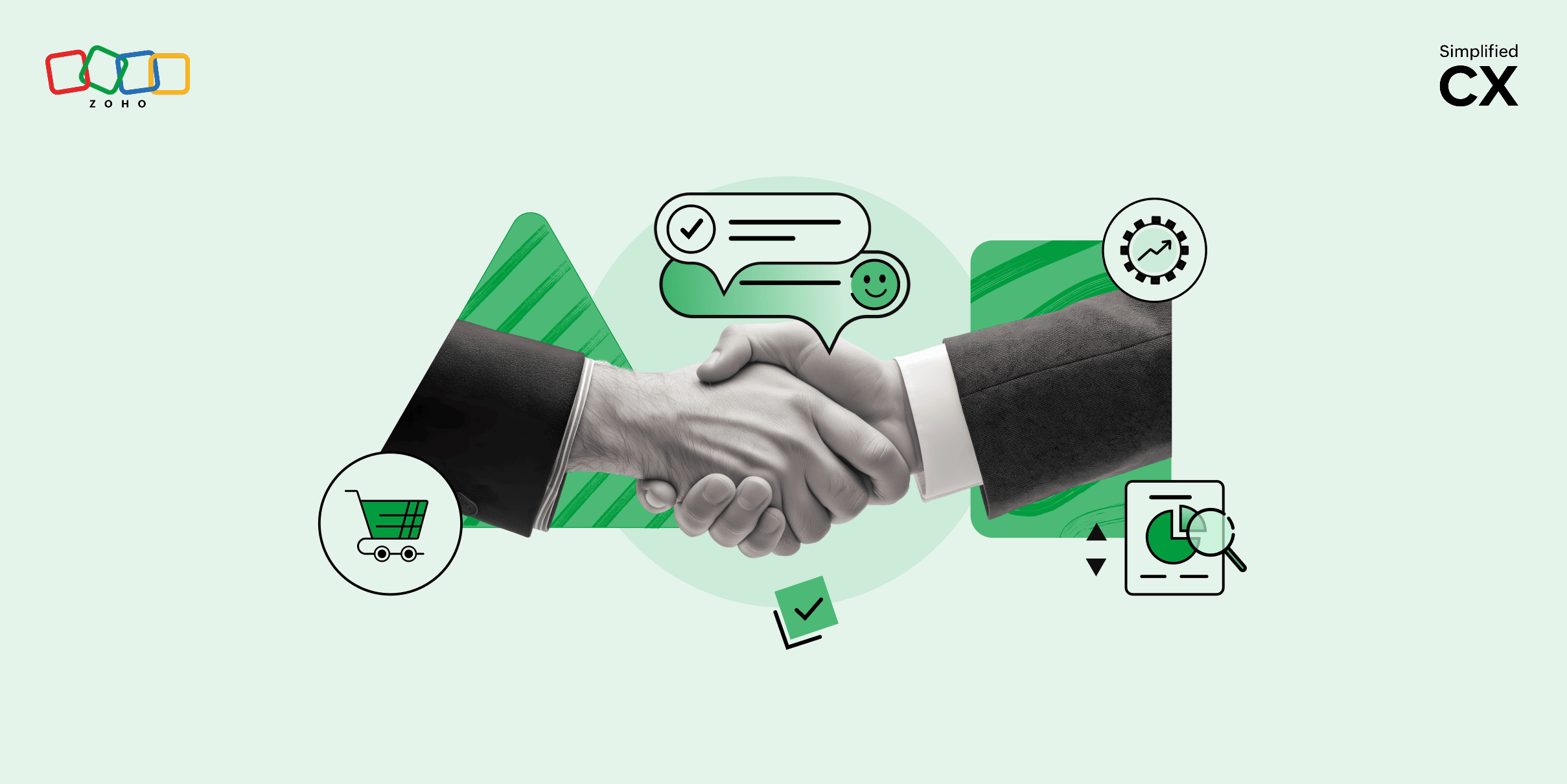A primer on preparing for enterprise sales
- Last Updated : October 24, 2023
- 256 Views
- 6 Min Read

Say you're now a fairly experienced salesperson. You've closed a good number of deals with small and medium businesses (SMBs) without much trouble, so you know the SMB game inside and out. Great—now it's time to set your sights on a bigger target.
Naturally, it's going to be enterprise businesses. "How different could it be?" you might wonder. "It should be more or less the same—only the size of the deal will be bigger." If you enter the field with this notion, you won't know what hit you when you face the reality.
You see, if selling is an art, enterprise sales is like sculpting Michelangelo's David inch by inch. Or if you belong to the faction that thinks selling is a science, you should know that enterprise sales is almost as daunting as understanding quantum mechanics.
That said, while selling to enterprise businesses is difficult, it's not impossible. Knowing how businesses on that scale function can help you figure out what to do and what not to do.
The following is a primer on just that. With these pointers, you'll get an idea of what to expect when trying to sell to an enterprise business and how you can handle curve balls more effectively.
#1 - Adapt to the enterprise mindset
The first thing you need to do is prepare yourself mentally. Almost all enterprise businesses have a certain level of seriousness to them because the stakes are higher compared to an SMB. This isn't to say that SMBs aren't serious businesses; it's just that the air of seriousness and formality is usually more prominent and pronounced when it comes to enterprise businesses.
Prepare to deal with people at different hierarchies who might not have the same kind of demeanor. A junior level executive might be more easygoing, but you can't expect the same when you deal with his/her boss. Learn to adapt to both kinds of interactions and seamlessly switch between them when needed.
Additionally, when it comes to dealing with enterprise businesses, it's not just you as an individual who needs to make this mindset change. Even your branding and marketing material, including your website, brochures, and the like must reflect that you're ready to play in the big leagues.
However, this doesn't mean you should completely lose your identity in the process. It's just that it's important you learn to strike the balance between formal and casual.
#2 - Nurture current relationships and forge new ones
The easiest way to try and make a deal with an enterprise business is if you know someone on the inside. First look for contacts among your friends, family, and acquaintances who can put you in touch with decision-makers in big organizations. You never know who could provide you with the lead to the next big deal for your business.
Next, you can try networking with decision-makers on LinkedIn, or even through cold emails. However, if you choose to take the cold email route, make sure to personalize it as much as possible, so that your mail doesn't go unnoticed amid other generic marketing mails.
When it comes to networking in the real world, your best chance is to make an impression at industry-focused conferences and conventions. This is where one finds the opportunity to meet a plethora of business leaders from different organizations. Attending such events not only gives you the opportunity to meet top executives, but also helps you gain insights into the challenges that the industry faces overall, as well as how you can tailor your solution to address them.
#3 - Show proof of success and scalability
Once you get an opportunity to talk about your offering to an enterprise business and pique their interest, you then need to prepare to showcase what your product/service can truly do for them.
It may be true that your customers so far have only been SMBs, but that doesn't mean you can't deliver the same results to big businesses. It's important you have everything in place to replicate the same levels of success at a bigger scale. Why? Otherwise, it'd be nothing but a huge leap of faith for any potential enterprise customer, who are prudent to make business decisions based on reason rather than on emotion.
Therefore, gather data on how your offerings have already helped customers and prepare detailed action plans on how you'll be able to do the same for a bigger business. One of the biggest challenges is to convince decision-makers that you can make things easy for hundreds or even thousands of people the same way you did for handfuls.
#4 - Do extensive homework about the organization
Irrespective of their size, all businesses have one basic expectation from potential vendors: that you care for them. The only way to demonstrate this even before a business becomes your customer is by getting to know all there is to know about them.
When you sense some level of interest from an organization, read up extensively about them and their vision. Make sure to keep yourself up to date with the latest news involving them. Use this information to demonstrate how your offerings can benefit them both in the present and in the future. This level of proactivity shows them how seriously you take the relationship.
#5 - Enhance the value you provide
When you're confident that your offering can greatly benefit an enterprise business, you should start thinking of ways to enhance the value you provide. One way to do this is to add more capabilities/dimensions to your offering, but this approach, in most cases, takes more time.
As an alternative, you can look for other vendors who complement your offerings and offer exclusive, tailor-made solutions for the customer. Such partnerships give big businesses the trust that your offering is well-rounded and comprehensive. However, don't overdo it by partnering with multiple vendors indiscriminately. Forge meaningful partnerships that make sense to your core business and add value to your customers.
Moreover, a certain level of exclusivity with respect to partnerships also gives the impression that you believe in maintaining high standards. Enterprise businesses love that.
#6 - Remember, there's not just one decision-maker
The biggest and most noticeable difference you'll see when dealing with enterprise businesses is that the decision-making process involves multiple people across different functions at various levels of the hierarchy. Your offering will never be evaluated by just one person. Say, for instance, you're a SaaS company. If a person from a big enterprise shows interest in your product, she alone will not be the person making the evaluation or decision. That person's boss might be involved. Someone from the information security team will be involved (obviously!), and so will be someone from the legal team. Then, you might have to talk to someone from the procurement team, finance team, and so on.
Countless minds are involved in making a purchase decision in an enterprise company. That's just how it is—because, as mentioned earlier, the stakes are high. Of course, if the questions are deeper and you aren't equipped to answer them, you're definitely going to involve someone with the relevant knowledge in your organization. Still, considering that the salesperson is the one primarily in a customer-facing role, having important cross-functional information at your fingertips leaves a good impression.
#7 - Be patient and persistent
All that's been said so far points to the indisputable fact that selling to enterprise businesses takes a lot longer than selling to an SMB. You have to talk to different people from the same organization. You might have to answer the same questions again and again, but to different people. You might have to wait for a long time to get replies or even get in touch with someone.
Throughout the process, at various points, one might get frustrated with the way things go and think of giving up. Accepting the fact that enterprise sales cycles are long and tedious, albeit for valid reasons, is what can help you keep going. And remember, since the stakes are high, the rewards are also equally high.
Of course, you didn't close your first ever SMB deal without facing any challenges, but by the fifth deal, you made changes and got better at it, and by the fifteenth deal, you arrived at some kind of personal playbook that works wonders.
The same can be done with enterprise businesses, too. You just need to put in more time, effort, and thought into your moves.


